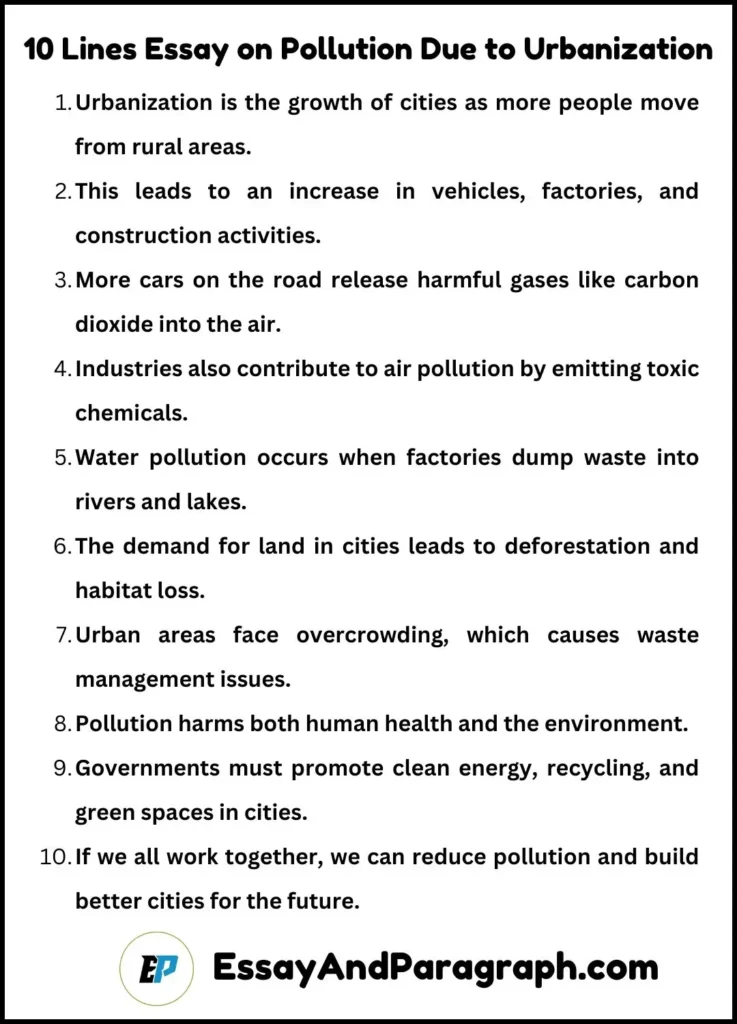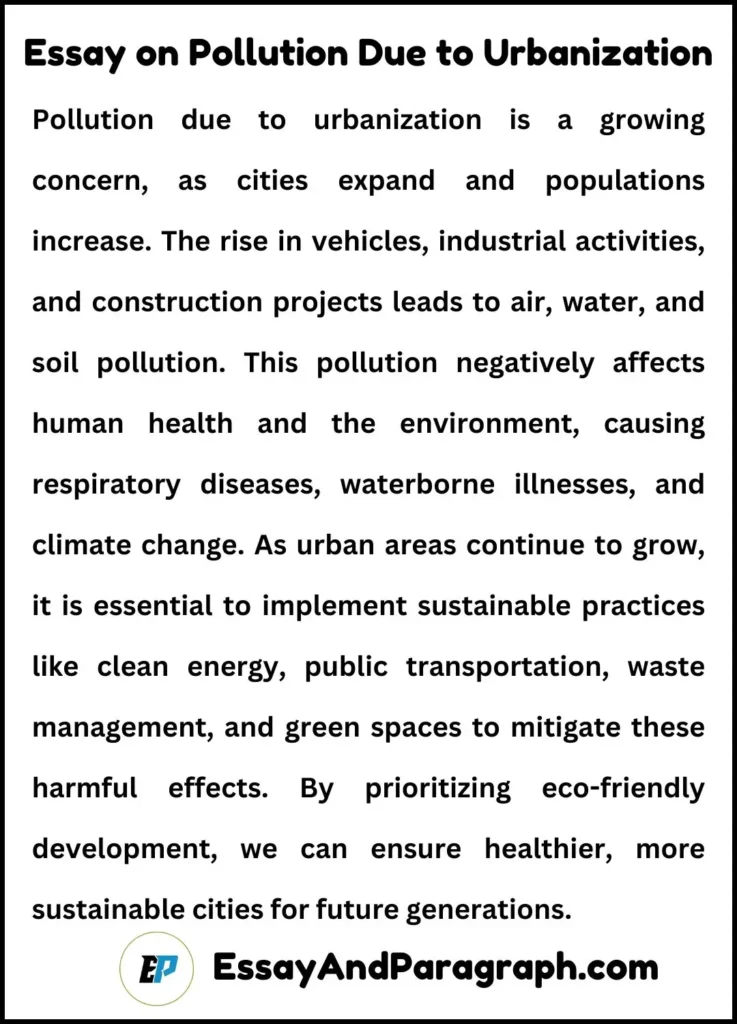Have you ever wondered how cities grow and how they affect the environment around us? Urbanization is the process of more people moving to cities, which leads to the expansion of buildings, roads, and industries. While it brings progress and development, it also causes serious problems like pollution. Pollution from urbanization harms the air, water, and land, making life in cities challenging for both humans and wildlife. In this article, we will learn how urbanization leads to pollution and the steps we can take to reduce its harmful effects.
10 Lines Essay on Pollution Due to Urbanization
Urbanization is the growth of cities as more people move from rural areas.
This leads to an increase in vehicles, factories, and construction activities.
More cars on the road release harmful gases like carbon dioxide into the air.
Industries also contribute to air pollution by emitting toxic chemicals.
Water pollution occurs when factories dump waste into rivers and lakes.
The demand for land in cities leads to deforestation and habitat loss.
Urban areas face overcrowding, which causes waste management issues.
Pollution harms both human health and the environment.
Governments must promote clean energy, recycling, and green spaces in cities.
If we all work together, we can reduce pollution and build better cities for the future.
 Essay on Pollution Due to Urbanization
Essay on Pollution Due to Urbanization
Essay on Pollution Due to Urbanization – 100 Words
Urbanization is the process of cities growing due to an increase in population. As more people move into cities, pollution becomes a serious problem. The air quality worsens as factories, vehicles, and industries release harmful gases into the environment. Along with air pollution, water sources are also contaminated by waste from factories and human activity. The increasing demand for resources leads to deforestation and habitat loss, adding to the environmental issues. In the long term, these effects can harm both nature and human health. It’s essential to adopt eco-friendly solutions to tackle pollution due to urbanization.
Short Essay on Pollution Due to Urbanization – 150 Words
Urbanization, the movement of people to cities, brings both benefits and challenges. One of the major challenges is pollution. As more people live in cities, the number of vehicles increases, leading to higher emissions of harmful gases like carbon dioxide and nitrogen oxides. This results in poor air quality and health problems like asthma and lung diseases. In addition, factories and industries in urban areas often release toxic chemicals into the air and water, further contributing to pollution. Water pollution becomes a concern as untreated waste from households and industries contaminates rivers and lakes. Urbanization also leads to deforestation, as trees are cut down to make space for new buildings and roads. This loss of greenery worsens climate change by reducing the Earth’s ability to absorb carbon dioxide. To reduce pollution, cities must invest in renewable energy, improve waste management, and promote the use of public transportation. By adopting sustainable practices, we can make cities cleaner and healthier for everyone.
Essay on Pollution Due to Urbanization – 200 Words
Urbanization, the shift of people from rural areas to cities, brings many challenges, one of the biggest being pollution. As cities grow, the number of vehicles on the road increases, releasing harmful gases into the air. Factories and industries also add to the problem by emitting toxic chemicals and waste. Water pollution becomes a major concern when industrial waste and sewage mix with freshwater sources. This pollution not only harms wildlife but also affects the health of city dwellers.
Another significant impact of urbanization is deforestation. As cities expand, forests are cleared for buildings, roads, and other infrastructures, which leads to habitat loss for many species. This destruction of green spaces reduces the Earth’s ability to absorb carbon dioxide, exacerbating global warming.
To reduce pollution caused by urbanization, governments must take action to promote clean energy, public transportation, and waste management systems. Public awareness about the effects of pollution and the importance of recycling can help reduce the environmental impact. If we all work together, we can ensure that urbanization benefits both humans and the planet.
Short Essay on Pollution Due to Urbanization – 250 Words
Urbanization is the process of cities expanding as more people move from rural areas. While urbanization brings economic opportunities and improved infrastructure, it also leads to several environmental issues, particularly pollution. As cities grow, so do the number of vehicles on the road. This increase in transportation causes a rise in air pollution, with harmful gases like carbon dioxide and nitrogen oxides being released into the atmosphere. Poor air quality not only contributes to climate change but also causes respiratory issues such as asthma and bronchitis.
Industrial activities in urban areas further contribute to pollution. Factories release harmful chemicals into the air and water, contaminating nearby ecosystems. Water pollution is a significant concern in cities, as untreated waste from industries and households often ends up in rivers and lakes, affecting aquatic life and water quality.
Urbanization also leads to deforestation, as forests are cleared to make way for buildings and infrastructure. This destruction of green spaces reduces biodiversity and contributes to global warming. Furthermore, as cities become more crowded, the amount of waste generated increases, putting pressure on waste management systems.
To combat pollution caused by urbanization, it is essential to promote sustainable practices. Governments can encourage the use of clean energy, better waste management, and public transportation. Additionally, creating more green spaces and reducing deforestation can help mitigate the negative effects of urbanization. By working together, we can build cities that are both sustainable and healthy for future generations.
Essay on Pollution Due to Urbanization – 500 Words
Urbanization is a process that involves the growth of cities, typically fueled by an increasing population moving from rural areas to urban centers. While urbanization has many benefits, such as increased employment opportunities and improved access to education and healthcare, it also brings about several environmental challenges, with pollution being one of the most pressing issues. Pollution due to urbanization not only affects the environment but also the health of people living in cities.
One of the major pollutants in urban areas is air pollution. The rapid increase in the number of vehicles, industries, and construction activities contributes to the release of harmful gases such as carbon dioxide (CO2), sulfur dioxide (SO2), and nitrogen oxides (NOx). These pollutants degrade air quality and lead to various respiratory diseases, including asthma and lung cancer. According to the World Health Organization (WHO), air pollution is responsible for millions of deaths each year, with urban areas being particularly vulnerable due to their high population density.
Water pollution is another critical issue caused by urbanization. In cities, factories, industries, and households release untreated waste directly into water bodies. This wastewater contains harmful chemicals and toxins that pollute rivers, lakes, and oceans. As water sources become contaminated, it not only affects aquatic life but also compromises the availability of clean drinking water for urban populations. Furthermore, the increased demand for water in cities leads to the over-extraction of groundwater, further exacerbating the issue.
Deforestation is a significant consequence of urbanization, as forests are cleared to make way for buildings, roads, and other infrastructures. This loss of greenery has far-reaching consequences, including the destruction of habitats for wildlife and the reduction of the Earth’s capacity to absorb carbon dioxide. Deforestation also disrupts local weather patterns and contributes to global climate change.
Urbanization also results in a growing amount of waste. Cities generate large quantities of solid waste, including plastic, metal, and organic waste. Without proper waste management systems, these materials end up in landfills or, worse, in oceans, where they harm marine life. Recycling programs and waste-to-energy technologies are crucial to managing urban waste and reducing pollution.
The long-term effects of pollution due to urbanization are profound. Not only does it harm the environment, but it also affects public health. Poor air quality can cause respiratory diseases, while contaminated water sources can lead to waterborne illnesses. The effects of pollution are not just limited to the immediate surroundings; they contribute to global problems such as climate change, which affects everyone, regardless of where they live.
To mitigate pollution caused by urbanization, it is essential for cities to adopt sustainable practices. Governments should invest in renewable energy sources such as solar and wind power, promote the use of public transportation, and enforce strict regulations on waste management and industrial emissions. In addition, urban planners should prioritize green spaces and develop smart infrastructure that reduces the environmental footprint of cities.
In conclusion, pollution due to urbanization is a serious problem that needs urgent attention. By taking proactive steps to reduce pollution, cities can continue to grow and thrive while protecting the environment and the health of their residents. Sustainable urban development is key to ensuring that future generations inherit a livable and healthy planet.
FAQs
1. What is urbanization, and how does it contribute to pollution?
Urbanization refers to the process of increasing population density in cities, often due to people moving from rural areas to urban centers. This contributes to pollution in several ways. First, the increased number of vehicles on the road leads to higher emissions of harmful gases like carbon dioxide and nitrogen oxides. Second, industrial growth in urban areas often results in the release of toxic chemicals and waste into the air and water. Lastly, the construction of new buildings and roads often leads to deforestation, which reduces the Earth’s ability to absorb CO2.
2. How does air pollution affect human health in urban areas?
Air pollution in cities can have severe effects on human health. Pollutants such as sulfur dioxide, carbon monoxide, and nitrogen oxides can irritate the respiratory system, causing conditions like asthma, bronchitis, and even lung cancer. According to the WHO, millions of people die each year from diseases caused by poor air quality. Children, elderly people, and those with pre-existing health conditions are particularly vulnerable to the harmful effects of urban air pollution.
3. What can be done to reduce water pollution in urban areas?
To reduce water pollution in cities, proper waste management systems must be put in place. This includes treating industrial and household wastewater before it is released into water bodies. Additionally, encouraging the use of eco-friendly products and reducing the amount of plastic and non-biodegradable waste can help decrease the contamination of water sources. Governments can also promote sustainable urban planning practices, such as constructing green roofs and permeable pavements, which help manage rainwater and prevent runoff.
4. How does urbanization lead to deforestation, and why is this a problem?
Urbanization leads to deforestation because as cities expand, forests are cleared to make room for new buildings, roads, and other infrastructures. This loss of forests is problematic because trees help absorb carbon dioxide and produce oxygen, playing a crucial role in regulating the Earth’s climate. Without forests, cities become more vulnerable to the effects of climate change, including increased temperatures and extreme weather events. Additionally, deforestation leads to the loss of biodiversity, as many species lose their natural habitats.
5. What are some sustainable solutions for reducing pollution due to urbanization?
Sustainable solutions for reducing pollution in urban areas include investing in renewable energy sources such as solar and wind power, promoting public transportation to reduce the number of vehicles on the road, and implementing efficient waste management systems to reduce landfill waste. Urban planners can also prioritize the creation of green spaces, such as parks and urban forests, to help absorb CO2 and provide clean air for city dwellers. Recycling programs and the promotion of eco-friendly products can also reduce waste and pollution.
6. How does urbanization affect biodiversity?
Urbanization negatively impacts biodiversity by destroying natural habitats. As cities expand, forests, wetlands, and grasslands are often cleared to make space for buildings and roads. This leads to the displacement of wildlife species, many of which struggle to survive in urban environments. Moreover, pollution from urban areas, including air, water, and noise pollution, further harms biodiversity by making the environment inhospitable for many species. Protecting natural habitats and promoting green spaces in cities can help preserve biodiversity.
Top 5 Quotes on Pollution Due to Urbanization
“The environment is where we all meet; where we all have a mutual interest; it is the one thing all of us share.” – Lady Bird Johnson
“We won’t have a society if we destroy the environment.” – Margaret Mead
“Urbanization without careful planning leads to pollution, destruction, and the erosion of our quality of life.” – Unknown
“The Earth does not belong to us; we belong to the Earth.” – Chief Seattle
“Pollution is nothing but the resources we are not harvesting. We allow them to disperse because we’ve been ignorant of their value.” – R. Buckminster Fuller

Summary
Pollution due to urbanization is a growing concern, as cities expand and populations increase. The rise in vehicles, industrial activities, and construction projects leads to air, water, and soil pollution. This pollution negatively affects human health and the environment, causing respiratory diseases, waterborne illnesses, and climate change. As urban areas continue to grow, it is essential to implement sustainable practices like clean energy, public transportation, waste management, and green spaces to mitigate these harmful effects. By prioritizing eco-friendly development, we can ensure healthier, more sustainable cities for future generations.



